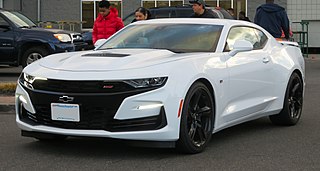
The Chevrolet Camaro is a mid-size American automobile manufactured by Chevrolet, classified as a pony car. It first went on sale on September 29, 1966, for the 1967 model year and was designed to compete with the Ford Mustang. The Camaro shared its platform and major components with the Firebird, produced by General Motors' Pontiac division that was also introduced for the 1967 model year.

The Chevrolet Chevelle is a mid-sized automobile that was produced by Chevrolet in three generations for the 1964 through 1977 model years. Part of the General Motors (GM) A-body platform, the Chevelle was one of Chevrolet's most successful nameplates. Body styles included coupes, sedans, convertibles, and station wagons. The "Super Sport" versions were produced through the 1973 model year and Lagunas from 1973 through to 1976.

The Chevrolet Corvair is a rear-engined, air-cooled compact car manufactured by Chevrolet in two generations between 1960–1969. A response to the Volkswagen Beetle, it was produced in 4-door sedan, 2-door coupe, convertible, 4-door station wagon, passenger van, commercial van, and pickup truck body styles in its first generation (1960–1964), and as a 2-door coupe, convertible or 4-door hardtop in its second (1965–1969). Total production was approximately 1.8 million vehicles from 1960 until 1969.
A replacement automobile engine is an engine or a major part of one that is sold individually without any other parts required to make a functional car. These engines are produced either as aftermarket parts or as reproductions of an engine that has gone out of production.
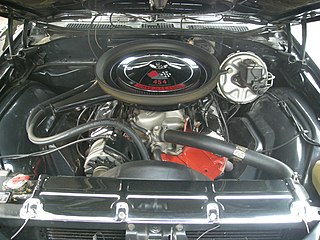
The Chevrolet "big-block" engine is a term for a series of large-displacement, naturally-aspirated, 90°, overhead valve, gasoline-powered, V8 engines; that were developed and produced by the Chevrolet Division of General Motors, from the 1950s until present.

The Chevrolet Monza is a subcompact automobile produced by Chevrolet for the 1975 through 1980 model years. The Monza is based on the Chevrolet Vega, sharing its wheelbase, width, and standard inline-four engine. The car was designed to accommodate the GM-Wankel rotary engine, but due to mediocre fuel economy and emissions-compliance issues the engine was cancelled, and a V8 engine option was substituted. The Monza name has also been used for several other cars.

The Chevrolet Chevy II/Nova is a small automobile manufactured by Chevrolet, and produced in five generations for the 1962 through 1979, and 1985 through 1988 model years. Built on the X-body platform, the Nova was the top selling model in the Chevy II lineup through 1968. The Chevy II nameplate was dropped after 1968, with Nova becoming the nameplate for all of the 1969 through 1979 models. It was replaced by the 1980 Chevrolet Citation introduced in the spring of 1979. The Nova nameplate returned in 1985, produced through 1988 as a S-car based, NUMMI manufactured, subcompact based on the front wheel drive, Japan home-based Toyota Sprinter.
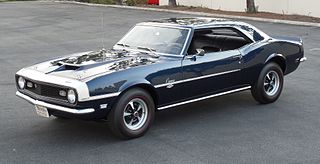
The Yenko Super Camaro was a modified Chevrolet Camaro prepared by Yenko Chevrolet, developed by the dealership owner and racer, Don Yenko, and subsequently aided by special parts ordering directly through Chevrolet.

The Chevrolet Turbo-Air 6 is a flat-six air-cooled automobile engine developed by General Motors (GM) in the late 1950s for use in the rear-engined Chevrolet Corvair of the 1960s. It was used in the entire Corvair line, as well as a wide variety of other applications.
The Powerglide is a two-speed automatic transmission designed by General Motors. It was available primarily on Chevrolet from January 1950 through 1973, although some Pontiac models also used this automatic transmission after the fire at the Hydra-Matic factory in 1953. Powerglides were used extensively on Pontiacs produced for the Canadian market with Chevrolet powertrains. They were also used with Nova engines in the DJ-5A Jeeps produced 1968-1970 by Kaiser-Jeep and widely used as delivery vehicles by the United States Post Office. When introduced on upper-level Chevrolet models in 1950, the Powerglide represented the first automatic transmission offered in a low-priced automobile; in contrast, Ford did not offer their automatic transmission until 1951, while Plymouth car buyers had to wait until 1954. The transmission was simple and very durable, which satisfied customers.
Callaway Cars Inc. is an American specialty vehicle manufacturer and engineering company that designs, develops, and manufactures high-performance product packages for cars, pickup trucks, and SUVs. They specialize in Corvettes and GM vehicles. New GM vehicles are delivered to Callaway facilities where these special packages and components are installed. Then the vehicles are delivered to GM new car dealers where they are sold to retail customers, branded as Callaway. Callaway Cars is one of four core Callaway companies, including Callaway Engineering, Callaway Carbon and Callaway Competition.

Chevrolet Performance, formerly "GM Performance Parts", is an automotive performance parts brand that sells everything from camshafts and cylinder heads to high-performance crate engines and upgrades for late-model Chevrolet vehicles. It was founded in 1967 to support the Trans-Am Camaro race teams.

The fifth-generation Chevrolet Camaro is a pony car that was manufactured by American automobile manufacturer Chevrolet from 2010 to 2015 model years. It is the fifth distinct generation of the muscle/pony car to be produced since its original introduction in 1967. Production of the fifth generation model began on March 16, 2009 after several years on hiatus since the previous generation's production ended in 2002 and went on sale to the public in April 2009 for the 2010 model year.
Donald "Don" Frank Yenko was an American car dealer and racecar driver best known for creating the Yenko Camaro, a high-performance version of the Chevrolet Camaro.

The first-generation Chevrolet Camaro is an American pony car introduced by Chevrolet in the fall of 1966 for the 1967 model year. It used a brand-new rear-wheel-drive GM F-body platform and was available as a 2-door, 2+2 seat, hardtop, and convertible. The F-body was shared with the Pontiac Firebird for all generations. A 230 cu in Chevrolet straight-6 was standard, with several Chevy V8s available as options. The first-generation Camaro was built through the 1969 model year.
American Muscle Car is a weekly television show on Speed, produced by Restoration Productions LLC., about muscle cars. Original release was in 2003. Each episode provides a timeline of each vehicle's history beginning with its first year of production to its most recent year of production. The show was initially designed to showcase traditional muscle cars such as the Chevrolet Camaro, Ford Mustang, and Dodge Charger. It eventually added other performance vehicles such as the Shelby Cobra and the, and even began to focus on specific eras such as the (disambiguation)|. In 2006 season, the show's focus was expanded to include designers and engineers of muscle car era.

The sixth-generation Chevrolet Camaro is an American pony car. Produced by automobile manufacturer Chevrolet, it was first introduced to the public on May 16, 2015. Sales started in 2015 for the 2016 model year. The Camaro now utilizes the GM Alpha platform shared with the Cadillac ATS and CTS and features MacPherson struts in front, rather than the former multi-link setup. General Motors claims that 70 percent of architectural components in the new Camaro are unique to the car.
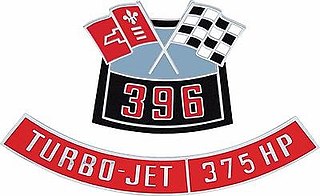
The L78 was a Big-Block engine produced by Chevrolet between 1965 and 1970. Rated at 425 hp (317 kW) for its first year, the rating dropped to 375 hp (280 kW) in subsequent years. Between 1966 and 1969 it was the most powerful Regular Production Option engine available in Chevrolet's intermediate line, making it a highly-collectible muscle car engine today.
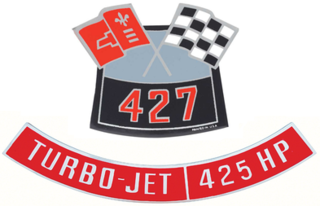
The L72 was a 427 cu in (7.0 L) 90° overhead valve V8 big-block engine produced by Chevrolet between 1966 and 1969. Initially rated at 450 horsepower, the rating dropped to 425 hp (317 kW) shortly after its release. In 1966 it was the most powerful engine available in the Corvette, and between 1966 and 1969 was the most powerful engine available in full-sized models. In 1969 the L72 was available via a Central Office Production Order (COPO) in Chevrolet's intermediate (Chevelle) and pony car (Camaro). Today these vehicles - referred to as COPOs - are among the most collectible 1960s performance cars.

The LT-1 is a Chevrolet small-block engine produced by the Chevrolet division of General Motors between 1970 and 1972. It was available exclusively in the Corvette and Camaro and was produced in relatively small quantities. It is regarded today as one of the greatest of the Chevrolet small-blocks, an engine that has been in production since 1955.
















